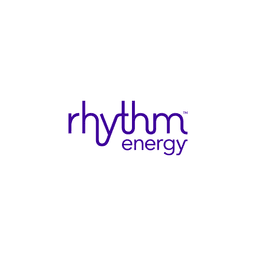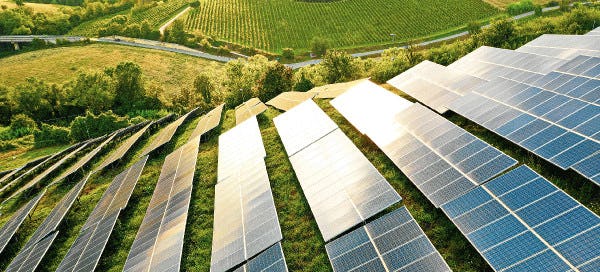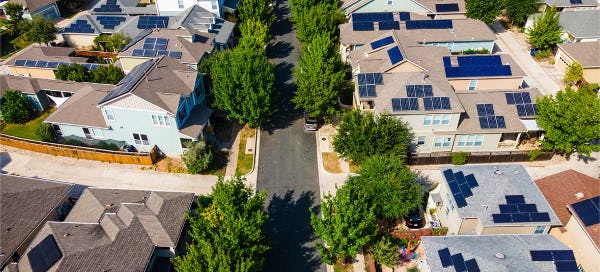As a homeowner, you've probably heard the buzz about solar panels and renewable energy. Perhaps you're one of the thousands interested in "going solar" but don't know how you'll pay for a project like installing a solar panel system.
That's a valid concern; however, because solar panels have become more readily available, options for solar financing have vastly improved over the years.
After doing the necessary research and receiving quotes for the panels that will match their needs and choosing the installation company, homeowners need to decide how to pay for the upgrade to renewable energy.
There is more than one solar financing solution available, so there's sure to be one that will easily fit your budget.
Let's take a look at everything you need to know about solar financing.
Why Install a Solar Panel System?
Solar power has become a trendy way to make renovations to your home. But is it just another trend? Before making any significant investment, most people want to know what they will gain by moving forward with their purchase. Aside from the financial benefits, there are numerous reasons why you should convert to using solar power:
Environmentally friendly source of energy
Gives you control of your electricity
Adds value to your home
Qualifies you for tax breaks and other incentives
Low maintenance
Reduces energy bills
Flexible financing options
Solar energy has become more affordable than ever before. Banks, credit unions, and other financial institutions have created financing options with fair terms and competitive interest rates.
What Is Solar Panel Financing?
The cost of a solar panel installation can vary based on several factors. These factors include the size of the home, the type of solar panels chosen, and the geographical location. Many homeowners turn to solar financing for help upgrading their homes.
Solar financing is an option for homeowners to get money to pay for solar panel installation. This valuable tool can be used to pay for the materials, labor, and any other associated costs. Today, there are many options for financing a residential solar panel project.
During the research process, homeowners should talk to the solar panel installation contractors for advice on where to look for solar panel financing options, but there are numerous online lenders available, too.
Paying for Your Solar Panels
Many financial organizations have their own options for financing solar panels, but it boils down to three basic ways:
Cash purchase
Solar loan
Solar lease/Power Purchase Agreement (PPA)
Which method you choose will depend on your own unique situation, but there really is no wrong way to go. The savings will begin to add up, and most solar panels eventually pay for themselves.
Types of Solar Financing Options
Purchasing solar panels is dependent on whether you have cash, good credit, and ownership of your home.
Cash Purchase
The most straightforward way to purchase your new solar panels is to pay for the installation with cash. This approach will save you the most money over the next several years since you won't be paying interest on a loan. You also receive immediate benefits through solar tax credits, rebates, and lower utility bills.
A cash purchase also means there are fewer conditions to follow since there is no third party involved. An outright purchase even shortens the amount of time it takes to see a return on your investment.
Residents who purchase their solar panels with cash also have higher long-term savings, lower energy bills starting the first month, and may be able to access tax deductions or exemptions from property or sales tax.
Solar Loans
Solar loans are useful for helping homeowners purchase solar panels without the high upfront payments required. With these loans, you still gain immediate ownership of your investment.
Like a regular loan, monthly payments are made, and an interest rate is applied. However, you are still listed as the owner. This listing entitles you to tax credits and rebates. Savings are higher than on a solar lease because you pay down the loan over a specified period, providing more savings each month.
Any home improvement can increase the value of your home, and solar panels are no different. You'll be able to sell your home faster and for a larger amount. This increase will help you earn back some of the money you may have paid in interest on your loan.
Some loans qualify for zero upfront costs, but you'll always see significant long-term savings and lower utility bills when you finance solar panels.
Solar Panel Leasing
Although this option has become less popular, solar leases and Power Purchase Agreements (PPAs) are still available to homeowners. These methods allow you to invest in solar panels, but the panels remain owned by a third party.
The third party provides the installation on your property and then sells you the electricity they produce at a predetermined rate, similar to traditional electricity companies. Unfortunately, you will never own your solar panel system.
With a lease or power purchase agreement, you are locked into your rate for approximately 25 years. Still, your rate will be about 10 to 30 percent lower than your current electricity rate. Traditionally, both of these options would see a gradual increase in your payment.
Your solar costs would increase each year under the old model, but this has changed over the last few years. Now, homeowners are locked into a specific rate for a contracted period.
One benefit of a lease/PPA is that the third-party owner is responsible for maintaining the solar panel system. The homeowner will not be liable for any upkeep on the system. However, the homeowner will not qualify for tax incentives or rebates.
Instead, these will go to the third-party company that owns the system. There also is no added value to your home because you are not the owner of the solar panels.
Owning Solar Panels Vs. Third-Party Financing
Buying anything directly with cash always makes more sense. It doesn't require paying any interest costs or financing fees, so the final cost ends up being less for the same solar panel system. However, it may be challenging for homeowners to have the necessary amount of cash available to buy solar panels outright.
Some homeowners may have the cash available but still choose solar financing because their money can be invested somewhere else.
Keep in mind that when a solar lease, PPA, or loan is used, homeowners will still have a monthly bill to pay in addition to the monthly electric bill. However, it should be significantly lower.
When homeowners choose solar financing through a lease or PPA, they typically have less to worry about. Maintenance, monitoring, insurance, and warranties are part of the solar lease or PPA agreement.
If something goes wrong with your solar panel system, it will be covered by the third party involved under the terms of the contract. Having this responsibility taken off their shoulders makes some homeowners more comfortable, while others like to manage the system directly.
When a homeowner has purchased their solar panels with cash or a solar loan, they are responsible for every aspect of the system. If it is not insured or under warranty, they will bear the financial costs of any system malfunctions, accidents, or other circumstances that render the system inadequate.
With a solar lease or PPA, the third-party owner is responsible for any maintenance and repairs, but they may limit what can be done to the property. Contracts can prohibit anything that could be harmful to the performance of the system.
How Credit Scores Impact Loans
The process of approving a personal loan will depend on the lender, including the minimum credit score. Typically, lenders want to see a minimum of 580, but higher scores will get better interest rates and repayment terms. Consider taking steps to improve your credit score before applying for a solar panel loan.
If you have a low credit score but are ready to move forward with solar panels, look for personal loans for bad credit. This approach will reduce the chances of being denied a loan. However, choose the loan carefully and ensure the minimum monthly payment can be made to prevent earning a lower credit score.
Homeowners with higher credit scores will easily qualify for personal loans with competitive interest rates. Lower interest rates can save hundreds of dollars a year.
Personal Loans Aren't the Only Option
There are other programs available besides personal loans to finance a residential solar system.
Government Loans
The Federal Housing Administration (FHA) has a program called PowerSaver that helps homeowners purchase energy-saving home improvements.
The Administration provides loans for solar panel financing with two options: PowerSaver Second Mortgage or PowerSaver Energy Rehab. Borrowers must meet certain criteria, including a minimum credit score of 660 and a debt-to-income ratio of 45%.
With the PowerSaver Second Mortgage solar panel financing option, homeowners can take out a second mortgage of up to $25,000 to make energy-saving upgrades to their homes. They will have up to 20 years to pay off this loan. However, to qualify for this financing option, homeowners cannot have an existing home equity loan, second lien, or second mortgage.
PowerSaver Energy Rehab is also known as a 203(k) loan and can be used by homeowners interested in wrapping the price of upgrades into a new loan. They have the total length of the mortgage to repay the loan.
Both of these programs provide interest rate options that are similar to personal loans, but the time allowed to repay them is twice as long. What's more, the FHA limits what these loans can be spent on, so homeowners are more likely to not spend frivolously and only purchase what they need.
Home Equity Loan
With a home equity loan, you finance renewable energy projects with money from the equity in your home. Banks may lend you up to 85% of the equity in your home, so if your home is valued at $300,000 but you only owe $200,000, you have $100,000 in equity. Most banks will qualify you for up to $85,000 for a loan.
However, your property can be used as collateral, meaning lower interest rates may be available when purchasing solar panels. It's important to note that with this type of financing, the bank can repossess if payments are no longer being made on the loan.
Who Provides Solar Loans?
Because of the increasing popularity of residential solar panels, many financial institutions have their own solar panel financing options. Homeowners can contact the following organizations about solar loans:
Solar panel manufacturers
Credit unions
National lending institutions
Certain local utilities
Banks
The company installing the solar panels should be able to suggest a money lender that will match their needs.
What to Look for When Financing Solar Panels
It's important to consider all of the options when choosing to finance solar panels. One percent doesn't seem like much, but it can make a difference of thousands of dollars over the years.
Keep these items in mind when looking at the options for solar panel financing.
Low interest rates
The shortest loan term payment that you can comfortably afford each month
Perks, like discounts for autopay
Loan type: secured or unsecured
Some lenders may try to push a specific loan but don't rush into a decision for solar loans or leases.
Incentives for Going Solar
Whether you are considering a cash payment, solar lease, or applying for a solar loan, there are many reasons why each is a viable option. Many programs exist to help homeowners offset the cost of investing in solar installation.
Federal Solar Tax Credits
When homeowners invest in a solar panel system, they become eligible for federal solar tax credits when filing their federal income taxes. The solar panels must have been installed during the current tax year and produce electricity for a residential home in the United States.
For systems placed in 2022, homeowners are eligible for a 26% tax credit, and in 2023 it decreases to 22%. Unless it is renewed, this tax incentive will expire in 2024. Currently, there is no maximum amount that can be claimed.
Utility Company Rebates
Sometimes utility companies help make your transition to solar power easier, too. Although you cannot claim it on your income tax return, the rebate amount is deducted from your system's total cost before calculating your tax credit.
State Government Rebates
State government rebates work a little differently from utility rebates. They cannot be used to reduce your federal tax credit.
State Tax Credits
On top of federal incentives, state and city-level programs exist to encourage homeowners to invest in solar panels. These programs are not in place of federal incentives; instead, they allow you to double up on savings.
In some states, solar panel systems are not included in property taxes. Homes are assessed as if the solar panels had not been installed, reducing the amount of taxes homeowners may owe.
Energy Efficient Mortgage Credits
Another way homeowners can finance solar panels is by looking into an Energy Efficient Mortgage (EEM). This program gives homeowners credit toward their mortgage, which creates more opportunities for homeowners to make energy-saving moves, qualify for bigger loans, and create an energy-efficient home.
An EEM is a home equity credit option that you get through the government or another qualified financial institution. Homeowners wanting to upgrade their home to renewable energy sources, like solar panels, may qualify for refinancing options, too.
Solar Buyback Plans in Texas
Rhythm is leading the way in changing how Texans pay for electricity. We offer residents of the state renewable energy plans that are powered by green sources, like solar energy.
By partnering with Rhythm, you are helping to provide healthier air for families, keep the lakes and rivers clean, and reduce your carbon footprint. Homeowners even see smaller utility bills with our solar buyback plan.
Even if you don't have solar panels, we can help. Call Rhythm today and go green!




